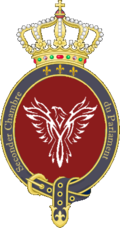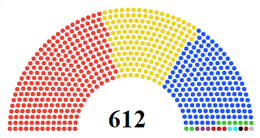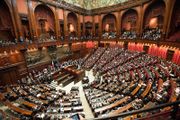Difference between revisions of "National Assembly (Midrasia)"
m |
m |
||
| (6 intermediate revisions by the same user not shown) | |||
| Line 1: | Line 1: | ||
| + | {{WIP}} | ||
{{Infobox legislature | {{Infobox legislature | ||
|name=National Assembly | |name=National Assembly | ||
|native_name=Ensemble Nacional | |native_name=Ensemble Nacional | ||
|coa_pic=Parliamentlogo.png | |coa_pic=Parliamentlogo.png | ||
| − | |coa_res= | + | |coa_res=120px |
|session_room= Mdr parliament.jpg | |session_room= Mdr parliament.jpg | ||
|house_type=Lower house | |house_type=Lower house | ||
|body=Midrasian Parliament | |body=Midrasian Parliament | ||
| − | |leader1_type= | + | |leader1_type=Speaker of the Assembly |
| − | |leader1= | + | |leader1=Robert Wallou |
| − | |party1=[[ | + | |party1=[[Social Democratic Party of Midrasia|SDP]] |
| − | |election1= | + | |election1=1 June 2016 |
|members=612 | |members=612 | ||
|structure1=MDRParliament2012.png | |structure1=MDRParliament2012.png | ||
|structure1_res=260px | |structure1_res=260px | ||
| − | |political_groups1= {{Collapsible list |title= | + | |political_groups1= {{Collapsible list |title=10 Groups |'''HM Government (419)'''<br> |
| − | {{colorbox|# | + | {{colorbox|#F03F32}} [[Social Democratic Party of Midrasia|SDP]] (260)<br> |
| − | {{colorbox|# | + | {{colorbox|#EDD21F}} Liberal League (159)<br> |
| − | {{colorbox|# | + | <br> |
| − | {{colorbox|# | + | '''Opposition Parties (193)'''<br> |
| − | {{colorbox|# | + | {{colorbox|#2155FF}} Conservative (173)<br> |
| − | {{colorbox|# | + | {{colorbox|#3FC730}} Green Party (9)<br> |
| − | {{colorbox|# | + | {{colorbox|#8C467F}} Midrasia First (3)<br> |
| − | {{colorbox|# | + | {{colorbox|#CF1D1D}} Socialist Party (3)<br> |
| − | |voting_system1= | + | {{colorbox|#27F2F2}} Liberty Party (2)<br> |
| − | |last_election1=5 May | + | {{colorbox|#000000}} MNP (1)<br> |
| − | |meeting_place=<span style="color:black">Ensemble Nacional<br /> Parliamentary Palace<br /> Thraice<br /> Midrasia</span> | + | {{colorbox|#A6251C}} [[Workers' Party of Midrasia|Workers' Party]] (1)<br> |
| + | {{colorbox|#BFB7C7}} Independent (1)}} | ||
| + | |voting_system1=Mixed-Member Proportional | ||
| + | |last_election1=5 May 2016 | ||
| + | |meeting_place=<span style="color:black">Ensemble Nacional<br /> Parliamentary Palace<br /> Thraice<br /> Midrasia</span> | ||
}} | }} | ||
| − | The '''National Assembly''' (Midrasian: ''Ensemble Nacional'') is the lower house of the bicameral parliament of [[Midrasia]], which meets in | + | The '''National Assembly''' (Midrasian: ''Ensemble Nacional'') is the lower house of the bicameral parliament of [[Midrasia]], which meets in Parliament House in Thraice. |
| − | The House is an elected body consisting of 612 members known as envoys (Midrasian: ''envoyiar)''. Members are elected | + | The House is an elected body currently consisting of 612 members known as envoys (Midrasian: ''envoyiar)''. Members are elected via MMP, meaning their are both constituency envoys and proportional envoys, whom represent their affiliated political parties. |
| − | The National Assmebly evolved at some point in Midrasia during the 18th century, overshadowing the senate as the primary chamber of the Midrasian Parliament. | + | The National Assmebly evolved at some point in Midrasia during the 18th century, overshadowing the senate as the primary chamber of the Midrasian Parliament. Under the Parliament Act 1894, the Senate's power to reject legislation was reduced to a delaying power. The Government is primarily responsible to the National Assembly and the prime minister stays in office only as long as he or she retains the support of a majority of its members. |
| − | Under the Parliament Act 1894, the Senate's power to reject legislation was reduced to a delaying power. The Government is primarily responsible to the National Assembly and the prime minister stays in office only as long as he or she retains the support of a majority of its members. | + | |
| + | The Assembly itself was originally elected via a system of First-past-the-post. However following the election of the SDP-Liberal coalition and the subsequent passing of the constitutional reform act, the Assembly moved to a more proportional system, whilst retaining elements of the traditional constituency system. | ||
Latest revision as of 15:27, 28 April 2016
| This page is a work in progress by its author(s) and should not be considered final. |
| National Assembly Ensemble Nacional | |
|---|---|
 | |
| Type | |
| Type | Lower house of the Midrasian Parliament |
| Leadership | |
| Speaker of the Assembly |
Robert Wallou, SDP Since 1 June 2016 |
| Structure | |
| Seats | 612 |
 | |
| Political groups |
10 Groups
|
| Elections | |
| Voting system | Mixed-Member Proportional |
| Last election | 5 May 2016 |
| Meeting place | |
 | |
|
Ensemble Nacional Parliamentary Palace Thraice Midrasia | |
The National Assembly (Midrasian: Ensemble Nacional) is the lower house of the bicameral parliament of Midrasia, which meets in Parliament House in Thraice.
The House is an elected body currently consisting of 612 members known as envoys (Midrasian: envoyiar). Members are elected via MMP, meaning their are both constituency envoys and proportional envoys, whom represent their affiliated political parties.
The National Assmebly evolved at some point in Midrasia during the 18th century, overshadowing the senate as the primary chamber of the Midrasian Parliament. Under the Parliament Act 1894, the Senate's power to reject legislation was reduced to a delaying power. The Government is primarily responsible to the National Assembly and the prime minister stays in office only as long as he or she retains the support of a majority of its members.
The Assembly itself was originally elected via a system of First-past-the-post. However following the election of the SDP-Liberal coalition and the subsequent passing of the constitutional reform act, the Assembly moved to a more proportional system, whilst retaining elements of the traditional constituency system.
